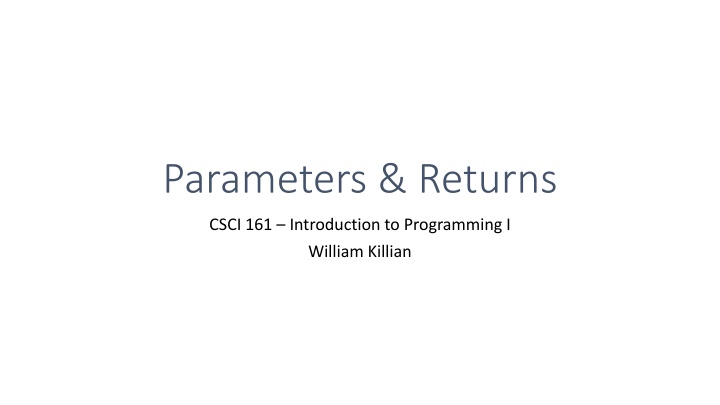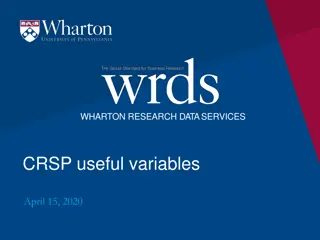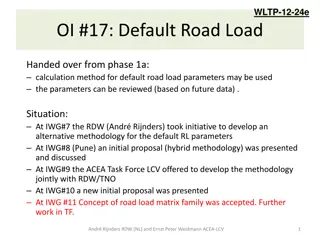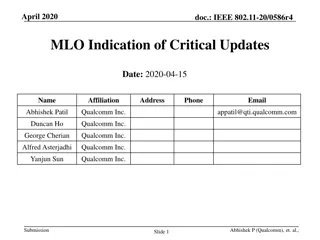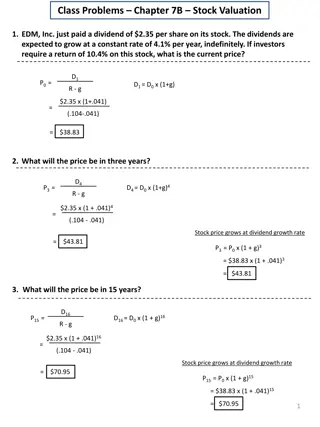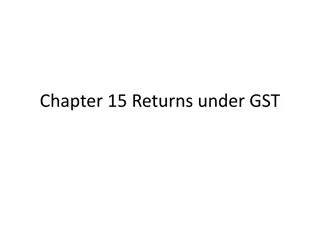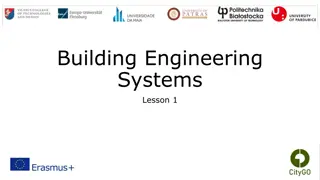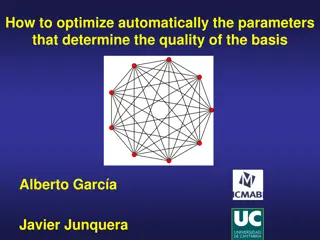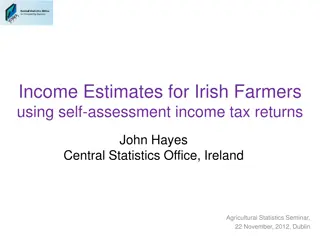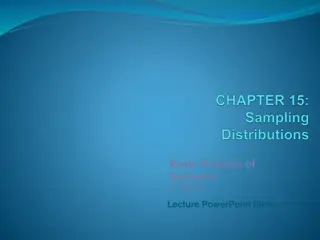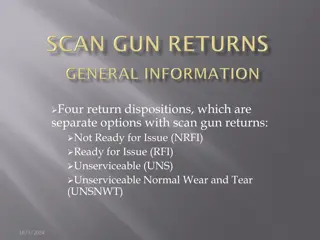Parameters & Returns
This book is a comprehensive introduction to programming in CSCI.161, written by William Killian. It covers fundamental programming concepts with clear explanations and practical examples. Whether you are a beginner or looking to enhance your programming skills, this book is a valuable resource for learning the basics of programming. From basic syntax to problem-solving techniques, this book will guide you through building a strong foundation in programming.
Download Presentation

Please find below an Image/Link to download the presentation.
The content on the website is provided AS IS for your information and personal use only. It may not be sold, licensed, or shared on other websites without obtaining consent from the author.If you encounter any issues during the download, it is possible that the publisher has removed the file from their server.
You are allowed to download the files provided on this website for personal or commercial use, subject to the condition that they are used lawfully. All files are the property of their respective owners.
The content on the website is provided AS IS for your information and personal use only. It may not be sold, licensed, or shared on other websites without obtaining consent from the author.
E N D
Presentation Transcript
Parameters & Returns CSCI 161 Introduction to Programming I William Killian
Redundant recipes Recipe for baking 20 cookies: oMix the following ingredients in a bowl: 4 cups flour 1 cup butter 1 cup sugar 2 eggs 40 pounds chocolate chips ... oPlace on sheet and Bake for about 10 minutes. Recipe for baking 40 cookies: oMix the following ingredients in a bowl: 8 cups flour 2 cups butter 2 cups sugar 4 eggs 80 pounds chocolate chips ... oPlace on sheet and Bake for about 10 minutes.
Parameterized recipe Recipe for baking 20 cookies: oMix the following ingredients in a bowl: 4 cups flour 1 cup sugar 2 eggs ... Recipe for baking N cookies: oMix the following ingredients in a bowl: N/5 cups flour N/20 cups butter N/20 cups sugar N/10 eggs 2N bags chocolate chips ... oPlace on sheet and Bake for about 10 minutes. parameter: A value that distinguishes similar tasks.
Redundant figures Consider the task of printing the following lines/boxes: ************* ******* *********************************** ********** * * ********** ***** * * * * *****
public static void main(String[] args) { drawLineOf13(); drawLineOf7(); drawLineOf35(); drawBox10x3(); drawBox5x4(); } A redundant solution This code is redundant. public static void drawLineOf13() { for (int i = 1; i <= 13; i++) { System.out.print("*"); } System.out.println(); } Would variables help? Would constants help? public static void drawLineOf7() { for (int i = 1; i <= 7; i++) { System.out.print("*"); } System.out.println(); } What is a better solution? drawLine - A method to draw a line of any number of stars. public static void drawLineOf35() { for (int i = 1; i <= 35; i++) { System.out.print("*"); } System.out.println(); } drawBox - A method to draw a box of any size.
Parameterization parameter: A value passed to a method by its caller. oInstead of drawLineOf7, drawLineOf13, write drawLine to draw any length. When declaring the method, we will state that it requires a parameter for the number of stars. When calling the method, we will specify how many stars to draw. 7 drawLine main ******* 13 drawLine *************
Declaring a parameter Stating that a method requires a parameter in order to run public static void name(typename) { statement(s); } Example: public static void sayPassword(int code) { System.out.println("The password is: " + code); }
Passing a parameter Calling a method and specifying values for its parameters name(expression); Example: public static void main(String[] args) { sayPassword(42); sayPassword(12345); } Output: The password is 42 The password is 12345
Parameters and loops A parameter can guide the number of repetitions of a loop. public static void main(String[] args) { chant(3); } public static void chant(int times) { for (int i = 1; i <= times; i++) { System.out.println("Just a salad..."); } } Output: Just a salad... Just a salad... Just a salad...
How parameters are passed When the method is called: oThe value is stored into the parameter variable. oThe method's code executes using that value. public static void main(String[] args) { chant(3); chant(7); } public static void chant(int times) { for (int i = 1; i <= times; i++) { System.out.println("Just a salad..."); } }
Common errors If a method accepts a parameter, it is illegal to call it without passing any value for that parameter. chant(); // ERROR: parameter value required The value passed to a method must be of the correct type. chant(3.7); // ERROR: must be of type int Exercise: Change the Stars program to use a parameterized method for drawing lines of stars.
Stars solution // Prints several lines of stars. // Uses a parameterized method to remove redundancy. public class Stars2 { public static void main(String[] args) { ? } // Prints the given number of stars plus a line break. public static void drawLine ? }
Multiple parameters A method can accept multiple parameters. (separate by , ) oWhen calling it, you must pass values for each parameter. Declaration: public static void name(typename, ...,typename) { statement(s); } Call: methodName(value, value, ..., value);
Multiple params example public static void main(String[] args) { printNumber(4, 9); printNumber(17, 6); printNumber(8, 0); printNumber(0, 8); } public static void printNumber(int number, int count) { for (int i = 1; i <= count; i++) { System.out.print(number); } System.out.println(); } Output: ? Modify the Stars program to draw boxes with parameters.
Stars solution // Prints several lines and boxes made of stars. // Third version with multiple parameterized methods. public class Stars3 { public static void main(String[] args) { drawLine(13); drawLine(7); drawLine(35); System.out.println(); drawBox(10, 3); drawBox(5, 4); drawBox(20, 7); } // Prints the given number of stars plus a line break. public static void drawLine(int count) { for (int i = 1; i <= count; i++) { System.out.print("*"); } System.out.println(); } ...
Stars solution, cont'd. ... // Prints a box of stars of the given size. public static void drawBox(int width, int height) { ? } }
Value semantics value semantics: When primitive variables (int, double) are passed as parameters, their values are copied. oModifying the parameter will not affect the variable passed in. public static void strange(int x) { x = x + 1; System.out.println("1. x = " + x); } public static void main(String[] args) { int x = 23; strange(x); System.out.println("2. x = " + x); ... } Output: 1. x = 24 2. x = 23
"Parameter Mystery" problem public class ParameterMystery { public static void main(String[] args) { int x = 9; int y = 2; int z = 5; mystery(z, y, x); mystery(y, x, z); } public static void mystery(int x, int z, int y) { System.out.println(z + " and " + (y - x)); } }
Strings string: A sequence of text characters. String name = "text"; String name = expression; oExamples: String name = "Dale Cooper"; int x = 3; int y = 5; String point = "(" + x + ", " + y + ")";
Strings as parameters public class StringParameters { public static void main(String[] args) { sayHello("Bert"); String teacher = "Ernie"; sayHello(teacher); } public static void sayHello(String name) { System.out.println("Welcome, " + name); } } Modify the Stars program to use string parameters. Use a method named repeat that prints a string many times.
Stars solution // Prints several lines and boxes made of stars. // Fourth version with String parameters. public class Stars4 { public static void main(String[] args) { drawLine(13); drawLine(7); drawLine(35); System.out.println(); drawBox(10, 3); drawBox(5, 4); drawBox(20, 7); } // Prints the given number of stars plus a line break. public static void drawLine(int count) { repeat("*", count); System.out.println(); } ...
Stars solution, cont'd. ... // Prints a box of stars of the given size. public static void drawBox(int width, int height) { drawLine(width); for (int line = 1; line <= height - 2; line++) { System.out.print("*"); repeat(...); System.out.println("*"); } drawLine(width); } // Prints the given String the given number of times. // Write repeat method in class
Java's Math class Method name Math.abs(value) Math.ceil(value) Math.floor(value) Math.log10(value) Math.max(value1, value2) Math.min(value1, value2) Math.pow(base, exp) Math.random() Math.round(value) Math.sqrt(value) Math.sin(value) Math.cos(value) Math.tan(value) Math.toDegrees(value) Math.toRadians(value) Description absolute value rounds up rounds down logarithm, base 10 larger of two values smaller of two values base to the exp power random double between 0 and 1 nearest whole number square root sine/cosine/tangent of an angle in radians Constant Description 2.7182818... 3.1415926... Math.E convert degrees to radians and back Math.PI
Calling Math methods Math.methodName(parameters) Examples: double squareRoot = Math.sqrt(121.0); System.out.println(squareRoot); int absoluteValue = Math.abs(-50); System.out.println(absoluteValue); System.out.println(Math.min(3, 7) + 2); The Math methods do not print to the console. oEach method produces ("returns") a numeric result.
Return return: To send out a value as the result of a method. oThe opposite of a parameter: Parameters send information in from the caller to the method. Return values send information out from a method to its caller. Math.abs(-42) -42 42 main 2.71 3 Math.round(2.71)
Math questions Evaluate the following expressions: oMath.abs(-1.23) oMath.pow(3, 2) oMath.pow(10, -2) oMath.sqrt(121.0) - Math.sqrt(256.0) oMath.round(Math.PI) + Math.round(Math.E) oMath.ceil(6.022) + Math.floor(15.9994) oMath.abs(Math.min(-3, -5)) Math.max and Math.min can be used to bound numbers. Consider an int variable named age. oWhat statement would replace negative ages with 0? oWhat statement would cap the maximum age to 40?
Quirks of real numbers Some Math methods return double or other non-int types. int x = Math.pow(10, 3); // ERROR: incompat. types Some double values print poorly (too many digits). double result = 1.0 / 3.0; System.out.println(result); // 0.3333333333333 The computer represents doubles in an imprecise way. System.out.println(0.1 + 0.2); oInstead of 0.3, the output is 0.30000000000000004
Type casting type cast: A conversion from one type to another. oTo promote an int into a double to get exact division from / oTo truncate a double from a real number to an integer Syntax: (type)expression Examples: double result = (double) 19 / 5; int result2 = (int) result; int x = (int) Math.pow(10, 3);
More about type casting Type casting has high precedence and only casts the item immediately next to it. o double x = (double) 1 + 1 / 2; // ? o double y = 1 + (double) 1 / 2; // ? You can use parentheses to force evaluation order. o double average = (double) (a + b + c) / 3; A conversion to double can be achieved in other ways. o double average = 1.0 * (a + b + c) / 3;
Returning a value public static typename(parameters) { statements; ... return expression; } Example: // Returns the slope of the line between the given points. public static double findSlope(int x1, int y1, int x2, int y2) { // What do we do here? ... return dy / dx; } o findSlope(1, 3, 5, 11) returns 2.0
Return examples // Converts degrees Fahrenheit to Celsius. public static double convertFToC(double degreesF) { double degreesC = 5.0 / 9.0 * (degreesF - 32); return degreesC; } // Computes triangle hypotenuse length given its side lengths. public static double computeHypotenuse(int a, int b) { double c = Math.sqrt(a * a + b * b); return c; } You can shorten the examples by returning an expression: public static double convertFToC(double degreesF) { return5.0 / 9.0 * (degreesF - 32); }
Common error: Not storing A return statement does NOT send a variable's name back to the calling method. public static void main(String[] args) { findSlope(0, 0, 6, 3); System.out.println("The slope is " + result); // ERROR: } // result not defined public static double findSlope(int x1, int x2, int y1, int y2) { double dy = y2 - y1; double dx = x2 - x1; double result = dy / dx; return result; }
Fixing the common error Instead, returning sends the variable's value back. oThe returned value must be stored into a variable or used in an expression to be useful to the caller. public static void main(String[] args) { double s = findSlope(0, 0, 6, 3); System.out.println("The slope is " + s); } public static double findSlope(int x1, int x2, int y1, int y2) { double dy = y2 - y1; double dx = x2 - x1; double result = dy / dx; return result; }
Exercises Write method countQuarters that takes an integer number of cents and returns the number of quarters represented by that many cents. Don t count dollars, as those will be dispensed as dollar bills. ocountQuarters (83) returns 3 ocountQuarters (1256) returns 2 Write method distance that takes four integer coordinates (x1, y1, x2, y2) and computes the distance between them. odistance (1, 2, 4, 6) returns 5.0
Exercises Write a method named calcArea that accepts a circle's radius as a parameter and returns its area. oUse the constant Math.PI in your solution. Write a method named calcDistanceFromOrigin that accepts x and y coordinates as parameters and returns the distance between that (x, y) point and the origin. Write a method named calcAttendancePoints that accepts a number of lectures attended by a student, and returns how many points a student receives for attendance. The student receives 2 points for each of the first 5 lectures and 1 point for each subsequent lecture. 36
Commenting If your method accepts parameters and/or returns a value, write a brief description of what the parameters are used for and what kind of value will be returned. oIn your comments, you can also write your assumptions about the values of the parameters. oYou may wish to give examples of what values your method returns for various input parameter values. oExample: // This method returns the factorial of the given integer n. // The factorial is the product of all integers up to that number. // Assumes that the parameter value is non-negative. // Example: factorial(5) returns 1 * 2 * 3 * 4 * 5 = 120. public static int factorial(int n) { ... } 37
